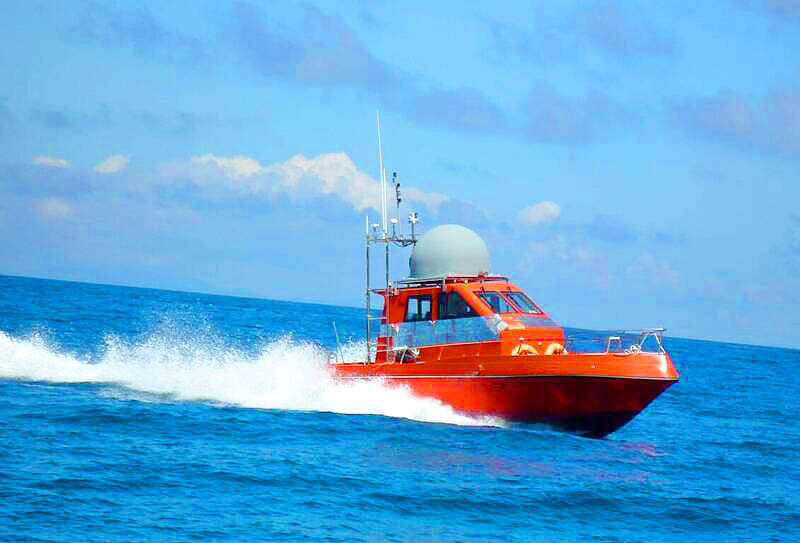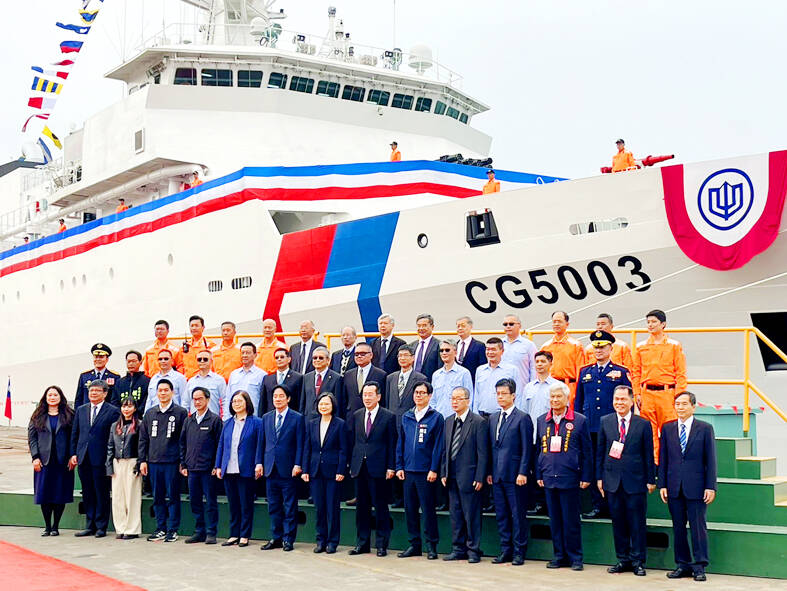The army is considering buying 200 armed sea drones after the Chungshan Institute of Science and Technology begins mass production in 2026, a source said yesterday.
The institute has said that it is developing armed target drones with sonar, radar and weapon modules, which would serve as multipurpose uncrewed boats that can perform coastal defense missions, strikes, and detect submarines and mines.
The army and navy have expressed interest in the uncrewed boat program, with the former estimating that it could use 200 of the vessels, a defense official familiar with the matter said, speaking on condition of anonymity.

Photo: Screen grab from the institute’s Web site
The army believes that armed sea drones could effectively counter or deter Chinese People’s Liberation Army Navy warships and landing craft near Taiwan, the official said.
Meanwhile, the navy believes it could use the drones to carry out raids against Chinese navy ships, they said, adding that the limited range of the autonomous watercraft could be improved by releasing them from larger naval vessels.
Sea drones, mainly those loaded with explosives to strike targets, are utilized extensively by the Ukrainian armed forces against Russians, with one reportedly sinking the Sergey Kotov on Sunday last week.

Photo: CNA
Meanwhile, President Tsai Ing-wen (蔡英文) and Vice President William Lai (賴清德), the president-elect, attended a ceremony marking the respective delivery and christening of the Coast Guard Administration’s 4,000-tonne Chiayi-class offshore patrol vessels Yunlin and Taipei.
The event was held at CSBC Corp, Taiwan’s (台灣國際造船) shipyard in Kaohsiung.
Local media interpreted the presence of Tsai and Lai at the ceremony as a move to boost morale among coast guard officers amid political furor revolving around the capsizing last month of a Chinese boat attempting to evade the coast guard off Kinmen County. Two Chinese fishers died in the incident.
Tsai refrained from commenting on the incident and did not take questions from reporters, but said in her address that the coast guard has Taiwan’s thanks for “standing steadfast at their post and defending the nation’s sovereign waters.”
The construction of the patrol vessels — which have boosted the nation’s indigenous shipbuilding sector, economy and the coast guard’s capabilities — is part of the nation’s indigenous shipbuilding program, she said.
The domestic manufacturing of warships and patrol vessels is key to conveying Taiwan’s commitment to safeguarding freedom and democracy to the world, she added.
The Yunlin and Taipei are respectively the third and fourth ship of their class, a cutter-type vessel that displaces 5,000 tonnes when fully equipped with 70mm rockets, 20mm guns, water cannons, a helipad and a field hospital.
The government has set aside NT$42.6 billion (US$1.4 billion) for an initiative to boost the local shipbuilding industry and beef up Taiwan’s maritime patrol capacity.
According to the Ocean Affairs Council, 141 coast guard ships are to be built by 2027 under the initiative, which began in 2018.
Additional reporting by CNA

INVESTIGATION: The case is the latest instance of a DPP figure being implicated in an espionage network accused of allegedly leaking information to Chinese intelligence Democratic Progressive Party (DPP) member Ho Jen-chieh (何仁傑) was detained and held incommunicado yesterday on suspicion of spying for China during his tenure as assistant to then-minister of foreign affairs Joseph Wu (吳釗燮). The Taipei District Prosecutors’ Office said Ho was implicated during its investigation into alleged spying activities by former Presidential Office consultant Wu Shang-yu (吳尚雨). Prosecutors said there is reason to believe Ho breached the National Security Act (國家安全法) by leaking classified Ministry of Foreign Affairs information to Chinese intelligence. Following interrogation, prosecutors petitioned the Taipei District Court to detain Ho, citing concerns over potential collusion or tampering of evidence. The

‘FORM OF PROTEST’: The German Institute Taipei said it was ‘shocked’ to see Nazi symbolism used in connection with political aims as it condemned the incident Sung Chien-liang (宋建樑), who led efforts to recall Democratic Progressive Party (DPP) Legislator Lee Kun-cheng (李坤城), was released on bail of NT$80,000 yesterday amid an outcry over a Nazi armband he wore to questioning the night before. Sung arrived at the New Taipei City District Prosecutors’ Office for questioning in a recall petition forgery case on Tuesday night wearing a red armband bearing a swastika, carrying a copy of Adolf Hitler’s Mein Kampf and giving a Nazi salute. Sung left the building at 1:15am without the armband and apparently covering the book with a coat. This is a serious international scandal and Chinese

Seventy percent of middle and elementary schools now conduct English classes entirely in English, the Ministry of Education said, as it encourages schools nationwide to adopt this practice Minister of Education (MOE) Cheng Ying-yao (鄭英耀) is scheduled to present a report on the government’s bilingual education policy to the Legislative Yuan’s Education and Culture Committee today. The report would outline strategies aimed at expanding access to education, reducing regional disparities and improving talent cultivation. Implementation of bilingual education policies has varied across local governments, occasionally drawing public criticism. For example, some schools have required teachers of non-English subjects to pass English proficiency

PERSONAL DATA: The implicated KMT members allegedly compiled their petitions by copying names from party lists without the consent of the people concerned Judicial authorities searched six locations yesterday and questioned six people, including one elderly Chinese Nationalist Party (KMT) member and five KMT Youth League associates, about alleged signature forgery and fraud relating to their recall efforts against two Democratic Progressive Party (DPP) legislators. After launching a probe into alleged signature forgery and related fraud in the KMT’s recall effort, prosecutors received a number of complaints, including about one petition that had 1,748 signatures of voters whose family members said they had already passed away, and also voters who said they did not approve the use of their name, Taipei Deputy Chief Prosecutor